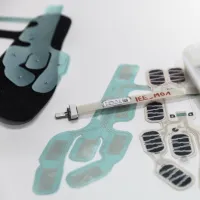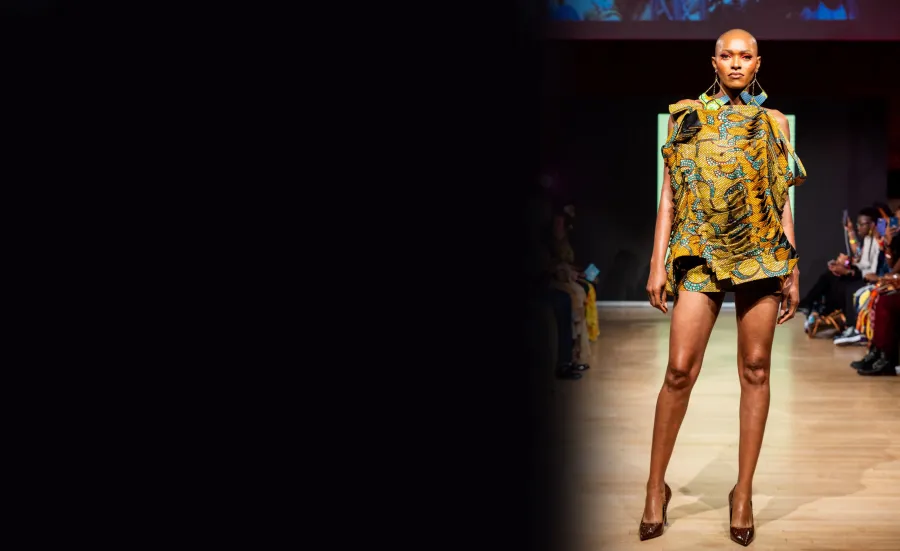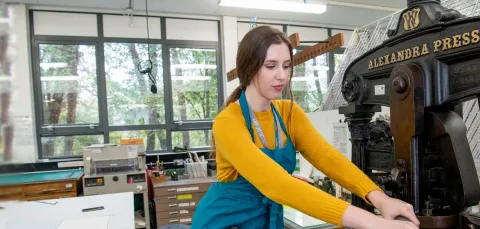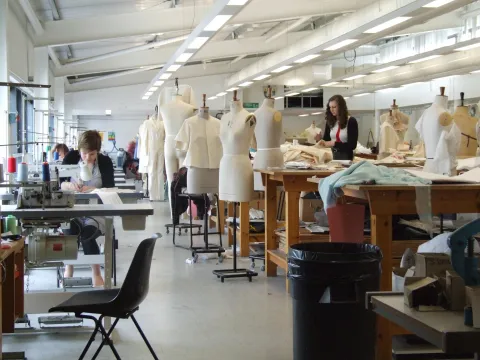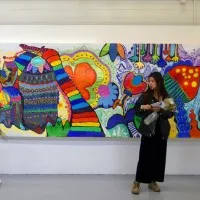About this course
Collaborate with renowned designers on our fast-paced and highly creative MA Fashion Design course. You’ll develop your individual design identity and complete a comprehensive exploration of advanced fashion design to prepare you with essential industry skills.
The philosophy of the MA Fashion Design course encourages you to be creative, push the boundaries and think outside the box. You'll use your research and design skills to formulate a professional, contemporary body of work that incorporates your design identity and ambitions for a future career in fashion.
On this master's in fashion design, you’ll consider ethical and sustainable practices in the context of contemporary fashion design. Backing up your creativity with research and advanced technical knowledge, this course will provide essential skills to enter a competitive industry, including:
- zero-waste creative cutting
- critical analysis and reflection
- market awareness
- trend, colour and material research
- styling and display
- professional presentation and Computer Aided Design (CAD) skills
Live projects, field trips and events
You'll have the opportunity to take part in live projects. These projects create real-world scenarios where you can practice your skills and work with experienced designers affiliated with London Fashion week and the British Fashion Council.
Opportunities include:
- planning and running photoshoots and catwalk shows
- creating lookbooks alongside photographers, stylists and hair and make-up artists
- attending industry events like London Fashion Week and Africa Fashion Week
- visits to exhibitions, shows, studios and production facilities across the UK and Europe
- attending student-led, co-curricular activities that celebrate creativity and diversity
Preparing for a career in industry
The collaborative approach of this course, with it's community of creatives across different disciplines, reflects the industry of fashion design. You'll be encouraged and supported in finding and applying to internships to gain valuable experience and help you begin your career and graduate as a confident problem solver and independent thinker, with a considered and refined design identity.
Previous students have gone on to become fashion designers and teachers, start their own labels and present their own collections at Pure London trade show.
We regularly review our courses to ensure and improve quality. This course may be revised as a result of this. Any revision will be balanced against the requirement that the student should receive the educational service expected. Find out why, when, and how we might make changes.
Our courses are regulated in England by the Office for Students (OfS).
Course lead
Your course leader is Reem Alasadi. Reem has presented her womenswear collections in London and Tokyo. She specialises in innovative design, concentrating on artisanship and hand-crafted excellence. She brings a wealth of knowledge and expertise in retail, design, visual marketing and merchandising to the course. She also has considerable expertise in sustainable and ethical design and has led many workshops in non-waste design.
Visit Reem's staff profile to find out more about her work.
MA Fashion Design at London Fashion Week
Learn more about this subject area

We had many opportunities to collaborate with professional designers and even showcase our work at Africa Fashion Week and London Fashion Week.
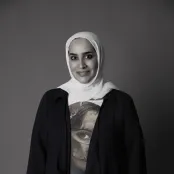
The program refined many of my skills in areas such as; sustainability, styling, creative research and fashion show production.
Course location
This course is based at Winchester.
Awarding body
This qualification is awarded by the University of Southampton.
Download the Course Description Document
The Course Description Document details your course overview, your course structure and how your course is taught and assessed.
Entry requirements
You’ll need a 2.2 degree or equivalent international qualification or significant suitable work experience to study this course.
You'll also need to submit a portfolio that articulates your interests and exploration of contemporary, ethical fashion design. Your portfolio should demonstrate your artistic ability relevant to fashion and include evidence of the process behind your work.
English language requirements
If English is not your first language, you must show that you can use English to the level we require. Visit our English language pages to find out which qualifications we accept and how you can meet our requirements.
If you are taking the International English Language Testing System (IELTS), you must get at least the following scores:
IELTS score requirements
- overall score
- 6.5
- reading
- 6.0
- writing
- 6.0
- speaking
- 6.0
- listening
- 6.0
If you do not meet the English language requirements through a test or qualification, you may be able to meet them by completing one of our pre-sessional English programmes before you start your course.
Pre-masters
If you don’t meet direct entry requirements, you can apply to complete a Pre-Master's programme through our partnership with OnCampus.
You'll progress to your chosen course after successfully completing the programme. Find out more about Pre-Master's programmes for international students.
Recognition of professional experience
If you don't have the exact entry requirements, but you have significant work experience in this sector we’ll assess your relevant professional experience, your subject knowledge and your aptitude for learning.
Your application will be considered on individual merit and you may be asked to attend an interview.
Got a question?
Please contact us if you're not sure you have the right experience or qualifications to get onto this course.
Email: enquiries@southampton.ac.uk
Tel: +44(0)23 8059 5000
Course structure
This fashion design master’s is full-time for 1 year. You’ll study studio-based modules with the support of technical staff and make use of specialist equipment and machinery.
Semester 1 overview
In your first semester you’ll research, explore and demonstrate your advanced design ability. You'll get an introduction to fashion design principles through a combination of projects and technical workshops.
From your module in Contextual Practice, you'll get to deepen your understanding of historical and contemporary contexts relating to fashion design.
Your core modules include:
- Introduction to Design Principles
- Professional Attributes: The Fashion Industry
- Contextual Practice
Semester 2 overview
Your second semester you’ll cover the following core modules:
- Professional practice: The Company
- Creative Experimentation: Pre-collection
You'll also prepare to work on your final project, which you'll complete during the summer
This is self-directed project that represents a real-world scenario where you will identify, develop and present cohesive collection of contemporary design outcomes.
Want more detail? See all the modules in the course.
Modules
The modules outlined provide examples of what you can expect to learn on this degree course based on recent academic teaching. As a research-led University, we undertake a continuous review of our course to ensure quality enhancement and to manage our resources. The precise modules available to you in future years may vary depending on staff availability and research interests, new topics of study, timetabling and student demand. Find out why, when and how we might make changes.
For entry in academic year 2026 to 2027
Year 1 modules
You must study the following modules :
Contextual Practice (Fashion Design)
This compulsory module aims to deepen your understanding of historical and contemporary contexts relating to fashion design. You will learn to critically reflect upon and analyse your work within a contextual framework through visual, verbal and written c...
Creative Experimentation: Pre-collection (Fashion Design)
This module offers you the opportunity for further investigation, risk-taking and critical self-assessment as you develop and define your unique fashion identity. Working towards a pre-collection will allow you to examine new ideas and test innovative...
Final Major Project (Fashion Design)
This is your final Masters module, in which you are required to identify, develop and present a unique and cohesive collection of contemporary design outcomes that capitalise on, and are demonstrative of, the Masters skills and experience you have accrued...
Introduction to Design Principles (Fashion Design)
This compulsory module introduces you to enhanced fashion design principles and encourages you to develop an innovative and exploratory perspective on your studio practice, through a combination of projects and technical workshops. This considered approac...
Professional Attributes: The Fashion Industry
Within this compulsory module and in conjunction with your studio practice, you will begin to explore your unique design identity. You will be introduced to crucial entrepreneurial skills required for self-promotion and employability as a professional cre...
Professional Practice: The Company (Fashion Design)
The Company is a cross-programme, collaborative and student-led initiative that celebrates creativity, inclusivity, diversity and community in live, real-world scenarios and which demonstrate relationships informed by expertise within and beyond the unive...
You must also choose from the following modules :
Creative Thinking and Problem Solving
The module been designed for the purpose of promoting and developing creative thinking and problem solving (CTPS) skills and addresses the need for individuals and teams who can ‘think outside the box’, and apply fresh thinking to practical, ‘real world’ ...
Digital Cultures
Digital Cultures is an elective module covering a broad range of topics relating to the encounter with digital environments, audiovisual content and the aesthetics and politics of media technologies in historical and contemporary contexts. This module int...
Entrepreneurship
The module enables you to recognise entrepreneurial traits and behaviours and apply elements of these to the real world. With a strong orientation towards the future, realised through forecasting in both finance and marketing, the module will provide ...
Experimental Publishing
The consideration of what publishing actual means today remains a relevant question for any creative practitioner. Over the past few years we have seen a huge rise in self-publishing, print on-demand services, tweeting and social media, from post-digital ...
Exploring the Visual Language of Display
The module provides thematic examples of the theories and practices of visual presentation and display explored through interdisciplinary and critical contexts appropriate to the MA pathways. It offers a number of critical “tools”, enhanced through refere...
Global Marketing
The module seeks to advance your knowledge on key issues of globalization and changes to marketing approaches that have taken place due to internationalisation.. The module situates the concepts and terminology of global marketing in a range of different ...
Sustainability in Business and Design
This module addresses critical perspectives in relation to sustainability and its impact in art, design and the creative industries. The module seeks to inform your thinking in relation to sustainability issues, be they environmental, social or economic, ...
Visual Culture
We live in a world that is saturated by images, from the far reaches of space to the sub-atomic level and just about everything in between. Images seem to have a special power in our lives, playing a part in the constructions of who and what we are and t...
Learning and assessment
Learning
On this course, you’ll develop your team working skills, strengthen your planning and project skills and learn to think critically and analytically
You'll have the option to attend workshops covering a range topics, such as:
- primary research
- developing a sketchbook
- computer aided design
You'll learn through a mix of studio work, tutorials, critiques, workshops and collaboration with peers and industry practitioners. You'll also have access to industrial studio spaces, a variety of technology and facilities to suit your goals, attend shows and exhibitions in London and hear from special guest lecturers.
This course welcomes a small group of new students each year, so your lecturers will take a personal approach to teaching and work closely with you to help develop your ideas. Our supportive and informal environment is created so you can approach academics to further your learning.
You’ll receive feedback on a weekly basis, ensuring your learning is on track.
Assessment
Assessment methods will vary between modules and not all activities will be formally assessed. Instead, some may be formative work to help you learn and apply new skills.
Generally, you will be assessed on:
- your portfolio
- final project collection
- evidence of the research towards your studio practice
- reflective assignments
Academic Support
Every student has a personal academic tutor, who is your contact for any queries about the course or for personal support. Tutors are in the studio every week, working with you on a one-to-one basis and in groups. They will run workshops and discussions, and lead peer-to-peer feedback sessions.
The school’s technical team is also available to help you use studio equipment and learn new techniques.
Careers and employability
Employability skills
This degree will allow you to develop and evidence subject-specific and targeted employability skills. This includes the required skill set for a range of future careers, further study, or starting your own business.
The skills you can expect to focus on and gain from this course include:
- Research
- Critical thinking
- Commercial awareness
- Self-management
- Confidence
- Communication
- Teamwork
- Creativity
- Networking
- EDI leadership
- Adaptability
- Problem solving
- Resilience
The employability and enterprise skills you'll gain from this course are reflected in the Southampton skills model. When you join us you'll be able to use our skills model to track, plan, and benefit your career development and progress.
Download skills overview
Career pathways
Graduates commonly work in a range of organisations or sectors including:
Self Employment,
Freelancing,
High Street Retailers,
Online Retailers,
Fashion Houses,
Interior Design Consultants,
Interior Design Studios,
universities,
Academic Libraries,
Magazines,
PR Companies,
Advertising Agencies,
Luxury Interior Design and Architecture.
- Fashion designer
- Fashion manager
- Fashion buyer
- Fashion university lecturer
- Stylist
- Textile designer
- Journalist
- Fashion merchandiser
- Pattern maker
- Fashion marketing specialist
- Visual merchandiser
- Colourist
- Fashion illustrator
- Fashion stylist
- Pattern cutter
- Clothing technologist
- Textile technologist
- Advertising account planner
- Fashion photographer
- Advertising art director
- Marketing executive
- Fashion designer
- Fashion buyer
- Teacher
- Visual merchandiser
- Management trainee
- Retail coordinator
- Brand associate
- Digital marketing executive
- Fashion editor
Job prospects for MA Fashion Design graduates
*Example graduate job titles and job prospect statistics taken from The Graduate Outcomes Survey, which gathers information about the activities and perspectives of graduates 15 months after finishing their course.

Work experience opportunities
Choosing to do work experience is a great way to enhance your employability, build valuable networks, and evidence your potential. Learn about the different work and industry experience options at Southampton.
Careers services and support
We are a top 20 UK university for employability (QS Graduate Employability Rankings 2022). Our Careers, Employability and Student Enterprise team will support you. This support includes:
- work experience schemes
- CV and interview skills and workshops
- networking events
- careers fairs attended by top employers
- a wealth of volunteering opportunities
- study abroad and summer school opportunities
We have a vibrant entrepreneurship culture and our dedicated start-up supporter, Futureworlds, is open to every student.
Your career ideas and graduate job opportunities may change while you're at university. So it is important to take time to regularly reflect on your goals, speak to people in industry and seek advice and up-to-date information from Careers, Employability and Student Enterprise professionals at the University.
Fees, costs and funding
Tuition fees
Fees for a year's study:
- UK students pay £10,400.
- EU and international students pay £26,200.
Deposit
If you're an international student on a full-time course, we'll ask you to pay £2,000 of your tuition fees in advance, as a deposit.
Your offer letter will tell you when this should be paid and provide full terms and conditions.
Find out about exemptions, refunds and how to pay your deposit on our tuition fees for overseas students page.
What your fees pay for
Your tuition fee covers the full cost of tuition and any exams. The fee you pay will remain the same each year from when you start studying this course. This includes if you suspend and return.
Find out how to pay your tuition fees.
Accommodation and living costs, such as travel and food, are not included in your tuition fees. There may also be extra costs for retake and professional exams.
Explore:
10% alumni discount
If you’re a graduate of the University of Southampton, you could be eligible for a 10% discount on your postgraduate tuition fees.
Postgraduate Master’s Loans (UK nationals only)
This can help with course fees and living costs while you study a postgraduate master's course.
If you study part-time, you may not be eligible for this loan. Find out if you're eligible.
Southampton Arts and Humanities Deans Global Talent Scholarship
There are 40 scholarships available to international students applying to study an undergraduate or postgraduate master's degree in an arts or humanities subject. Successful applicants will get £10,000 towards their tuition fees.
Find out more about the Southampton Arts and Humanities Deans Global Talent Scholarship, including eligibility, deadlines and how to apply.
Winchester School of Art Progression Scholarship
This scholarship is available to all eligible UK and international Winchester School of Art graduates who go directly from an undergraduate to a master's degree within the school. You will get either £1500, £2,500 or £3,000 depending on the grade you get for your undergraduate degree.
Learn more about the Winchester School of Art Progression Scholarship.
Other postgraduate funding options
A variety of additional funding options may be available to help you pay for your master’s study. Both from the University and other organisations.
Funding for EU and international students
Find out about funding you could get as an international student.
How to apply
- Use the blue 'apply for this course' button on this page to take you to our postgraduate admissions system.
- Create an account which gives you access to your own application portal. .
- Search for the course you want to apply for.
- Complete the application form and upload any supporting documents.
- Submit your application.
For further details of our admission process, read our step by step guide to postgraduate taught applications.
Application deadlines
There are different application deadlines for this course. Applications are expected to close:
- International students: Wednesday 26 August 2026, midday UK time
- UK students: Wednesday 9 September 2026, midday UK time
We advise applying early as applications may close before the expected deadline if places are filled.
Application assessment fee
There is no application assessment fee for postgraduate courses starting in 2026.
Supporting information
Portfolio guidance
Your portfolio is one of the most important parts of your application. It is your opportunity to show us your work, and it is our opportunity to find out more about you.
Your portfolio should contain your most recent and relevant work. It should be clear, logical and a professional presentation of your work.
You can submit your portfolio in any of the following formats:
- PDF file under 10mb in size
- PowerPoint presentation
- blog
- website
- YouTube video
We understand you may not be coming straight from an undergraduate course and we will accept older work in your portfolio. However, please include as much of your recent work as possible. We welcome and assess each application individually.
MA Fashion Design
- Evidence of the process behind final pieces e.g. drawing and
sketches; try to include figurative drawings and Computer Aided
Design (CAD) work. - Examples of practical work including toiles/muslins and final
garments or outfits. - Images of your final work e.g. catwalk/runway show, ‘look-book’
or photo-shoot. - Please include a variety of projects in your portfolio.
Approximately 4-6 is recommended.
Personal statement
When you apply you’ll need to submit a personal statement explaining why you want to take the course.
You’ll need to include information about:
- your knowledge of the subject area
- why you want to study a postgraduate qualification in this course
- how you intend to use your qualification
References are not required for this programme.
Please include the required paperwork showing your first degree and your IELTS English language test score (if you are a non-native English speaker) with your application. Without these, your application may be delayed.
You may also be asked to provide:
- an art portfolio
What happens after you apply
You'll be able to track your application through our online Applicant Record System.
We receive a high volume of applications for this course. This means you may not receive a response to your application for up to 12 weeks.
Unfortunately, due to number of applications we receive, we may not be able to give you specific feedback on your application if you are unsuccessful.
Equality and diversity
We treat and select everyone in line with our Equality and Diversity Statement.
Got a question?
Please contact us if you're not sure you have the right experience or qualifications to get onto this course.
Email: enquiries@southampton.ac.uk
Tel: +44(0)23 8059 5000
Related courses
-
Study
- View all courses
- Taught postgraduate study
- Pre-sessional English courses
-
Subjects
- Acoustical engineering
- Aeronautical and astronautical engineering
- Ageing and gerontology
- Archaeology
- Art, design and fashion
- Audiology
- Biological sciences
- Biomedical and medical engineering
- Business, accounting, finance and marketing
- Chemistry
- Civil engineering
- Computer science and software engineering
- Economics
- Education
- Electrical and electronic engineering
- English
- Film studies
- French
- Geography and environmental science
- History
- Languages and linguistics
- Law
- Maritime engineering
- Mathematical sciences
- Mechanical engineering
- Medicine
- Music
- Nursing, midwifery and healthcare
- Ocean and Earth science
- Philosophy
- Photonics and optoelectronics
- Physics and astronomy
- Politics and international relations
- Psychology
- Social statistics and demography
- Sociology, social policy and criminology
-
PhDs and research degrees
- Create your own research project
-
Find a PhD project
- A missing link between continental shelves and the deep sea: Have we underestimated the importance of land-detached canyons?
- A study of rolling contact fatigue in electric vehicles (EVs)
- Acoustic monitoring of forest exploitation to establish community perspectives of sustainable hunting
- Acoustic sensing and characterisation of soil organic matter
- Advancing intersectional geographies of diaspora-led development in times of multiple crises
- Aero engine fan wake turbulence – Simulation and wind tunnel experiments
- Against Climate Change (DACC): improving the estimates of forest fire smoke emissions
- All-in-one Mars in-situ resource utilisation (ISRU) system and life-supporting using non-thermal plasma
- An electromagnetic study of the continent-ocean transition southwest of the UK
- An investigation of the relationship between health, home and law in the context of poor and precarious housing, and complex and advanced illness
- Antibiotic resistance genes in chalk streams
- Being autistic in care: Understanding differences in care experiences including breakdowns in placements for autistic and non-autistic children
- Biogeochemical cycling in the critical coastal zone: Developing novel methods to make reliable measurements of geochemical fluxes in permeable sediments
- Bloom and bust: seasonal cycles of phytoplankton and carbon flux
- British Black Lives Matter: The emergence of a modern civil rights movement
- Building physics for low carbon comfort using artificial intelligence
- Business studies and management: accounting
- Business studies and management: banking and finance
- Business studies and management: decision analytics and risk
- Business studies and management: digital and data driven marketing
- Business studies and management: human resources (HR) management and organisational behaviour
- Business studies and management: strategy, innovation and entrepreneurship
- Carbon storage in reactive rock systems: determining the coupling of geo-chemo-mechanical processes in reactive transport
- Cascading hazards from the largest volcanic eruption in over a century: What happened when Hunga Tonga-Hunga Ha’apai erupted in January 2022?
- Characterisation of cast austenitic stainless steels using ultrasonic backscatter and artificial intelligence
- Climate Change effects on the developmental physiology of the small-spotted catshark
- Climate at the time of the Human settlement of the Eastern Pacific
- Collaborative privacy in data marketplaces
- Compatibility of climate and biodiversity targets under future land use change
- Cost of living in modern and fossil animals
- Creative clusters in rural, coastal and post-industrial towns
- Deep oceanic convection: the outsized role of small-scale processes
- Defect categories and their realisation in supersymmetric gauge theory
- Defining the Marine Fisheries-Energy-Environment Nexus: Learning from shocks to enhance natural resource resilience
- Design and fabrication of next generation optical fibres
- Developing a practical application of unmanned aerial vehicle technologies for conservation research and monitoring of endangered wildlife
- Development and evolution of animal biomineral skeletons
- Development of all-in-one in-situ resource utilisation system for crewed Mars exploration missions
- Ecological role of offshore artificial structures
- Effect of embankment and subgrade weathering on railway track performance
- Efficient ‘whole-life’ anchoring systems for offshore floating renewables
- Electrochemical sensing of the sea surface microlayer
- Engagement with nature among children from minority ethnic backgrounds
- Enhancing UAV manoeuvres and control using distributed sensor arrays
- Ensuring the Safety and Security of Autonomous Cyber-Physical Systems
- Environmental and genetic determinants of Brassica crop damage by the agricultural pest Diamondback moth
- Estimating marine mammal abundance and distribution from passive acoustic and biotelemetry data
- Evolution of symbiosis in a warmer world
- Examining evolutionary loss of calcification in coccolithophores
- Explainable AI (XAI) for health
- Explaining process, pattern and dynamics of marine predator hotspots in the Southern Ocean
- Exploring dynamics of natural capital in coastal barrier systems
- Exploring the mechanisms of microplastics incorporation and their influence on the functioning of coral holobionts
- Exploring the potential electrical activity of gut for healthcare and wellbeing
- Exploring the trans-local nature of cultural scene
- Facilitating forest restoration sustainability of tropical swidden agriculture
- Faulting, fluids and geohazards within subduction zone forearcs
- Faulting, magmatism and fluid flow during volcanic rifting in East Africa
- Fingerprinting environmental releases from nuclear facilities
- Flexible hybrid thermoelectric materials for wearable energy harvesting
- Floating hydrokinetic power converter
- Glacial sedimentology associated subglacial hydrology
- Green and sustainable Internet of Things
- How do antimicrobial peptides alter T cell cytokine production?
- How do calcifying marine organisms grow? Determining the role of non-classical precipitation processes in biogenic marine calcite formation
- How do neutrophils alter T cell metabolism?
- How well can we predict future changes in biodiversity using machine learning?
- Hydrant dynamics for acoustic leak detection in water pipes
- If ‘Black Lives Matter’, do ‘Asian Lives Matter’ too? Impact trajectories of organisation activism on wellbeing of ethnic minority communities
- Illuminating luciferin bioluminescence in dinoflagellates
- Imaging quantum materials with an XFEL
- Impact of neuromodulating drugs on gut microbiome homeostasis
- Impact of pharmaceuticals in the marine environment in a changing world
- Improving subsea navigation using environment observations for long term autonomy
- Information theoretic methods for sensor management
- Installation effect on the noise of small high speed fans
- Integrated earth observation mapping change land sea
- Interconnections of past greenhouse climates
- Investigating IgG cell depletion mechanisms
- Is ocean mixing upside down? How mixing processes drive upwelling in a deep-ocean basin
- Landing gear aerodynamics and aeroacoustics
- Lightweight gas storage: real-world strategies for the hydrogen economy
- Machine learning for multi-robot perception
- Machine learning for multi-robot perception
- Marine ecosystem responses to past climate change and its oceanographic impacts
- Mechanical effects in the surf zone - in situ electrochemical sensing
- Microfluidic cell isolation systems for sepsis
- Migrant entrepreneurship, gender and generation: context and family dynamics in small town Britain
- Miniaturisation in fishes: evolutionary and ecological perspectives
- Modelling high-power fibre laser and amplifier stability
- Modelling soil dewatering and recharge for cost-effective and climate resilient infrastructure
- Modelling the evolution of adaptive responses to climate change across spatial landscapes
- Nanomaterials sensors for biomedicine and/or the environment
- New high-resolution observations of ocean surface current and winds from innovative airborne and satellite measurements
- New perspectives on ocean photosynthesis
- Novel methods of detecting carbon cycling pathways in lakes and their impact on ecosystem change
- Novel technologies for cyber-physical security
- Novel transparent conducting films with unusual optoelectronic properties
- Novel wavelength fibre lasers for industrial applications
- Ocean circulation and the Southern Ocean carbon sink
- Ocean influence on recent climate extremes
- Ocean methane sensing using novel surface plasmon resonance technology
- Ocean physics and ecology: can robots disentangle the mix?
- Ocean-based Carbon Dioxide Removal: Assessing the utility of coastal enhanced weathering
- Offshore renewable energy (ORE) foundations on rock seabeds: advancing design through analogue testing and modelling
- Optical fibre sensing for acoustic leak detection in buried pipelines
- Optimal energy transfer in nonlinear systems
- Optimal energy transfer in nonlinear systems
- Optimizing machine learning for embedded systems
- Oxidation of fossil organic matter as a source of atmospheric CO2
- Partnership dissolution and re-formation in later life among individuals from minority ethnic communities in the UK
- Personalized multimodal human-robot interactions
- Preventing disease by enhancing the cleaning power of domestic water taps using sound
- Quantifying riparian vegetation dynamics and flow interactions for Nature Based Solutions using novel environmental sensing techniques
- Quantifying the response and sensitivity of tropical forest carbon sinks to various drivers
- Quantifying variability in phytoplankton electron requirements for carbon fixation
- Resilient and sustainable steel-framed building structures
- Resolving Antarctic meltwater events in Southern Ocean marine sediments and exploring their significance using climate models
- Robust acoustic leak detection in water pipes using contact sound guides
- Silicon synapses for artificial intelligence hardware
- Smart photon delivery via reconfigurable optical fibres
- The Gulf Stream control of the North Atlantic carbon sink
- The Mayflower Studentship: a prestigious fully funded PhD studentship in bioscience
- The calming effect of group living in social fishes
- The duration of ridge flank hydrothermal exchange and its role in global biogeochemical cycles
- The evolution of symmetry in echinoderms
- The impact of early life stress on neuronal enhancer function
- The oceanic fingerprints on changing monsoons over South and Southeast Asia
- The role of iron in nitrogen fixation and photosynthesis in changing polar oceans
- The role of singlet oxygen signaling in plant responses to heat and drought stress
- Time variability on turbulent mixing of heat around melting ice in the West Antarctic
- Triggers and Feedbacks of Climate Tipping Points
- Uncovering the drivers of non-alcoholic fatty liver disease progression using patient derived organoids
- Understanding recent land-use change in Snowdonia to plan a sustainable future for uplands: integrating palaeoecology and conservation practice
- Understanding the role of cell motility in resource acquisition by marine phytoplankton
- Understanding the structure and engagement of personal networks that support older people with complex care needs in marginalised communities and their ability to adapt to increasingly ‘digitalised’ health and social care
- Unpicking the Anthropocene in the Hawaiian Archipelago
- Unraveling oceanic multi-element cycles using single cell ionomics
- Unravelling southwest Indian Ocean biological productivity and physics: a machine learning approach
- Using acoustics to monitor how small cracks develop into bursts in pipelines
- Using machine learning to improve predictions of ocean carbon storage by marine life
- Vulnerability of low-lying coastal transportation networks to natural hazards
- X-ray imaging and property characterisation of porous materials
- Funding your research degree
- How to apply for a PhD or research degree
- How to make a PhD enquiry
- Support while studying your PhD or research degree
- Exchanges and studying abroad
- Undergraduate study
-
Tuition fees, funding and scholarships
- Fee status
- Scholarships
- Undergraduate funding options
-
Postgraduate funding options
-
Postgraduate scholarships
- Black Futures Postgraduate Research Scholarships (Environmental and Life Sciences)
- Black Futures scholarship
- China Excellence Scholarship
- GREAT Scholarships 2025 – Egypt
- GREAT Scholarships 2025 – France
- GREAT Scholarships 2025 – Ghana
- Horizon Europe fee waiver
- India Excellence Scholarship
- Nigeria Excellence Scholarship
- Nursing Global Impact Scholarship
- Postgraduate Taught Diversity Scholarship (Environmental and Life Sciences)
- Social Impact Scholarships
- Southampton Business School (MSc) Dean Scholarship (UK)
- Southampton Faculty of Medicine PGT Talent Scholarship
- Southampton History Patricia Mather and Helen Patterson Scholarship
- Southampton MA Holocaust scholarships
- Southampton Philosophy David Humphris-Norman Scholarship
- Southampton Philosophy MA Scholarship
- Southampton Photonics Impact Scholarship
- Southampton UK Alumni Music Scholarship
- Study in Art and Media Technology Scholarship
- Thailand Excellence Scholarship
- The National Institute for Health and care Research South Central INSIGHT Programme
- The South Coast Doctoral Training Partnership Social Science PhD Studentships
- Vietnam Excellence Scholarship
-
Postgraduate scholarships
-
International funding options
-
Scholarships for international students
- Engineering Global Talent Scholarship
- Medical Technology, Innovation and Design Master’s Scholarship
- Merit scholarships for international undergraduates
- Presidential bursaries
- Winchester School of Art Postgraduate Global Talent Scholarship
- Becas Chile Scholarship
- Chevening Scholarships
- China Scholarship Council Scholarships
- COLFUTURO Scholarships
- Commonwealth Distance Learning Scholarships
- Commonwealth Master's Scholarships
- Commonwealth PhD Scholarships
- Commonwealth PhD Scholarships for high income countries
- Commonwealth Shared Scholarships
- Excellence Scholarship
- FIDERH Scholarships
- Southampton Education Civic Scholarship
- Fulbright Awards
- Southampton Ageing and Gerontology Talent Scholarship
- Southampton Teachers' Postgraduate Scholarship
- FUNED Scholarships
- Great Scholarships 2024 – Mexico
- Great Scholarships 2024 – Nigeria
- Marshall Scholarship
- Saïd Foundation Scholarships
- Southampton Canadian Prestige Scholarship for Law
- Xiamen University PhD Scholarships
- GREAT scholarships 2026 – Indonesia
-
Scholarships for international students
- External funding opportunities
- Short courses
- Lunchtime evening and weekend courses
- Clearing
- Summer schools
- Get a prospectus
- Student life
-
Research
- Our impact
- Research projects
- Research areas
- Research facilities
- Collaborate with us
-
Institutes, centres and groups
- Active Living
- Advanced Fibre Applications
- Advanced Laser Laboratory
- Advanced Project Management Research Centre
- Antibody and Vaccine Group
- Astronomy Group
- Autism Community Research Network @ Southampton (ACoRNS)
- Bioarchaeology and Osteoarchaeology at Southampton (BOS)
- Bladder and Bowel Management
- Cell and Developmental Biology
- Centre for Defence and Security Research
- Centre for Developmental Origins of Health and Disease
- Centre for Digital Finance
- Centre for Eastern European and Eurasian Studies (CEEES)
- Centre for Empirical Research in Finance and Banking (CERFIB)
- Centre for Geometry, Topology, and Applications
- Centre for Global Health and Policy (GHaP)
- Centre for Green Maritime Innovation (cGMI)
- Centre for Health Technologies
- Centre for Healthcare Analytics
- Centre for Human Development, Stem Cells and Regeneration
- Centre for Imperial and Postcolonial Studies
- Centre for Inclusive and Sustainable Entrepreneurship and Innovation (CISEI)
- Centre for International Film Research (CIFR)
- Centre for International Law and Globalisation
- Centre for Internet of Things and Pervasive Systems
- Centre for Justice Studies
- Centre for Linguistics, Language Education and Acquisition Research
- Centre for Machine Intelligence
- Centre for Maritime Archaeology
- Centre for Medieval and Renaissance Culture (CMRC)
- Centre for Political Ethnography (CPE)
- Centre for Research in Accounting, Accountability and Governance
- Centre for Research on Work and Organisations
- Centre for Resilient Socio-Technical Systems
- Centre for Transnational Studies
- Child and Adolescent Research Group
- Clinical Ethics, Law and Society (CELS)
- Clinical Legal Education
- Computational Nonlinear Optics
- Cyber Security Academy
- Data Science Group
- Digital Oceans
- EPSRC and MOD Centre for Doctoral Training in Complex Integrated Systems for Defence and Security
- Economic Theory and Experimental Economics
- Economy, Society and Governance
- Electrical Power Engineering
- Environmental Hydraulics
- Gas Photonics in Hollow Core Fibres
- Geochemistry
- Global Health (Demography)
- Global Health Community of Practice
- Gravity group
- High Power Fibre Lasers
- Hollow Core Fibre
- Human Genetics and Genomic Medicine
- Infection
- Infrastructure Group
- Institute of Developmental Sciences
- Institute of Maritime Law (IML)
- Integrated Photonic Devices
- Interdisciplinary Musculoskeletal Health
- International Centre for Ecohydraulics Research (ICER)
- Language Assessment and Testing Unit (LATU)
- Laser-Direct-Write (LDW) Technologies for Biomedical Applications
- Law and Technology Centre
- Long Term Conditions
- Magnetic Resonance
- Mathematical Modelling
- Medicines Management
- Molecular and Precision Biosciences
- Multiwavelength Accretion and Astronomical Transients
- National Biofilms Innovation Centre (NBIC)
- National Centre for Research Methods
- National Infrastructure Laboratory
- Nature-Based Ocean Solutions
- Nonlinear Semiconductor Photonics
- Ocean Perception Group
- Operational Research
- Optical Engineering and Quantum Photonics Group
- Paediatrics and Child Health - Clinical and Experimental Sciences
- People, Property, Community
- Photonic Systems, Circuits and Sensors Group
- Physical Optics
- Primary Care Research Centre
- Quantum, Light and Matter Group
- Silica Fibre Fabrication
- Silicon Photonics
- Skin Sensing Research Group
- Southampton Ethics Centre
- Southampton Health Technology Assessments Centre (SHTAC)
- Southampton High Energy Physics group
- Southampton Imaging
- Southampton Theory Astrophysics and Gravity (STAG) Research Centre
- Stefan Cross Centre for Women, Equality and Law
- String theory and holography
- The India Centre for Inclusive Growth and Sustainable Development
- The Parkes Institute
- Tony Davies High Voltage Laboratory
- Ultrafast X-ray Group
- Vision Science
- WSA Exchange
- Work Futures Research Centre (WFRC)
- Support for researchers
- Faculties, schools and departments
- Interdisciplinary research
- Find people and expertise
- Research jobs
- Business
- Global
- About
- Visit
- Alumni
- Departments
- News
- Events
- Contact
Arts and Cultural Leadership
Communication Design
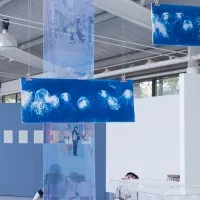
Contemporary Curating
Creative Technologies
Design Innovation and Technology
Design Innovation and Technology
Design Management
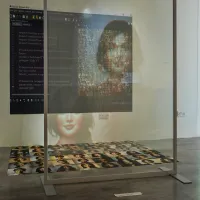
Digital Media
